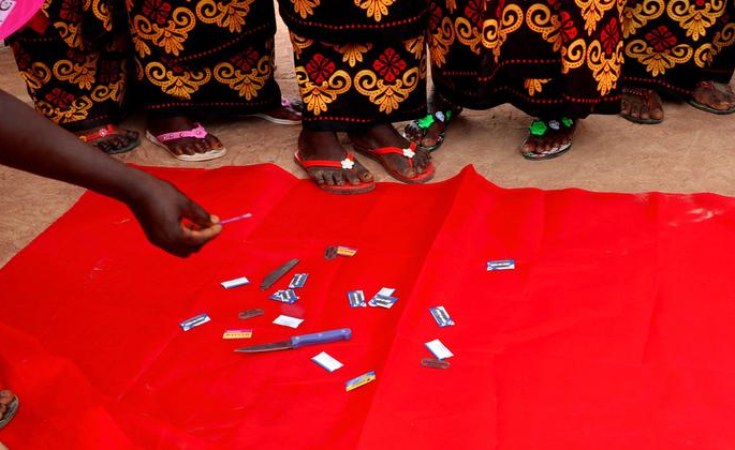Amudat District, Uganda — "My sister should not have passed away in the way she did," Josephine Telo told a group of women who had survived female genital mutilation. This was the practice - the mutilation of a woman or girl's genitals for no medical reason - that killed her sister.
Ms. Telo and her sister, Napala Nangiro, are from the Amudat District of Uganda, a country where female genital mutilation has been banned since 2010 and where incidence of the practice has been falling.
As of 2022, some 0.2 percent of women aged 15-49 had been cut, according to surveys, but with considerable variation within the country. Prevalence of female genital mutilation in the Karamoja and Sebei sub-regions, for example, was estimated in 2016 to be 8 per cent among girls aged 15 to 24.
Still, for Ms. Nangiro, there was little reason to be concerned about female genital mutilation. In her community, which is part of the Karamojong ethnic group, it is not practiced. And when she married her husband Ikomol, who was from an ethnic group that does practice female genital mutilation, he had no interest in subjecting her to the custom.
But unbeknownst to the young couple, Ikomol's mother had other ideas.
Deceived while in labour
Ms. Nangiro became pregnant shortly after getting married, at age 18. Her mother-in-law was extremely supportive and involved throughout the pregnancy, Ms. Telo recalled. That is, until Ms. Nangiro went into labour.
Ms. Telo explained that her sister went to the Loroo Health Centre III, accompanied by her mother-in-law, the morning her contractions began. After an examination, health workers instructed them to return in several hours, after the labour had progressed a bit more.
But rather than go home, the mother-in-law proposed they stop to rest at the nearby home of a friend. Ms. Nangino had no idea this friend, an elderly woman who was a traditional birth attendant, was also a practitioner of female genital mutilation.
"After a period of time, Nangino started to feel uneasy due to the lateness of the hour," Ms. Telo described. "She emphasized the urgency of returning to the health center."
But the mother-in-law said there was no need to return to the health centre; the elderly woman could assist with the childbirth instead, she said.
Assaulted and abandoned
Ms. Nangino laboured for hours into the night.
During her intense contractions, the elderly woman performed a type of female genital mutilation known as excision, involving the removal of the clitoris and inner labia.
"Nangiro was oblivious to the act," Ms. Telo said. "She mistakenly thought the woman was aiding in the childbirth."
But when Ms. Nangino began to hemorrhage, the elderly woman fled.
Realizing that her daughter-in-law might bleed to death, the mother-in-law left Ms. Nangino alone to find the young woman's family.
"My sister was left to fight for her life, as there was no one available to rush her to the hospital," Ms. Telo said.
Early the next morning, Ms. Nangiro's mother received word from neighbours that her daughter was dying.
The young woman was unconscious by the time her mother arrived. A motorbike taxi, known as boda boda, was secured to transport her back to Loroo Health Centre III.
There, the doctor identified that "some of her body parts had been removed," as community members would later describe, and the fetus had died.
Ms. Nangiro was rushed to Amudat Hospital by ambulance, but she died en route.
A struggle for justice
Consolata Aleper, the chairperson of Loroo Sub-County female genital mutilation surveillance team, has been supporting the family and community in the aftermath of this tragedy.
She says Ms. Nangiro's death - which took place three years ago - has torn a hole in the family and the wider community.
Ms. Nangiro's husband, Ikomol, moved away from the village, bereft. It is said he has not remarried. Members of the broader community say they have lost a daughter.
And Ms. Telo has remained distraught about the loss of her sister despite the years that have passed. She says she is haunted by her sister's suffering - and by the lack of justice.
The incident was reported to Loroo Police Station, but both the woman who performed the mutilation and the mother-in-law who arranged it have disappeared.
But more and more people are speaking out about the issue - especially since 2021, when ActionAid International Uganda and UNFPA, the United Nations sexual and reproductive health agency, initiated a project in Amudat District.
The programme, under the UNFPA-UNICFE Joint Programme to Eliminate FGM, aims to address gender-based violence, including female genital mutilation. Through the project, surveillance teams have been established throughout the sub-county.
The incidence of female genital mutilation is declining in Uganda, which is the only country in the Eastern and Southern Africa region on track to eliminate the practice by 2030. Still, the surveillance groups in Amudat continue to receive two to three alerts of female genital mutilation cases per month.
Ms. Telo has also been engaged through the project. She has received support from counsellors at a nearby centre for survivors of gender-based violence, and she has been able to share her sister's story. In this way, tragedy is helping to galvanize support to end female genital mutilation and other forms of violence.
Female genital mutilation, Ms. Telo said, emphatically, "is not a good practice."


